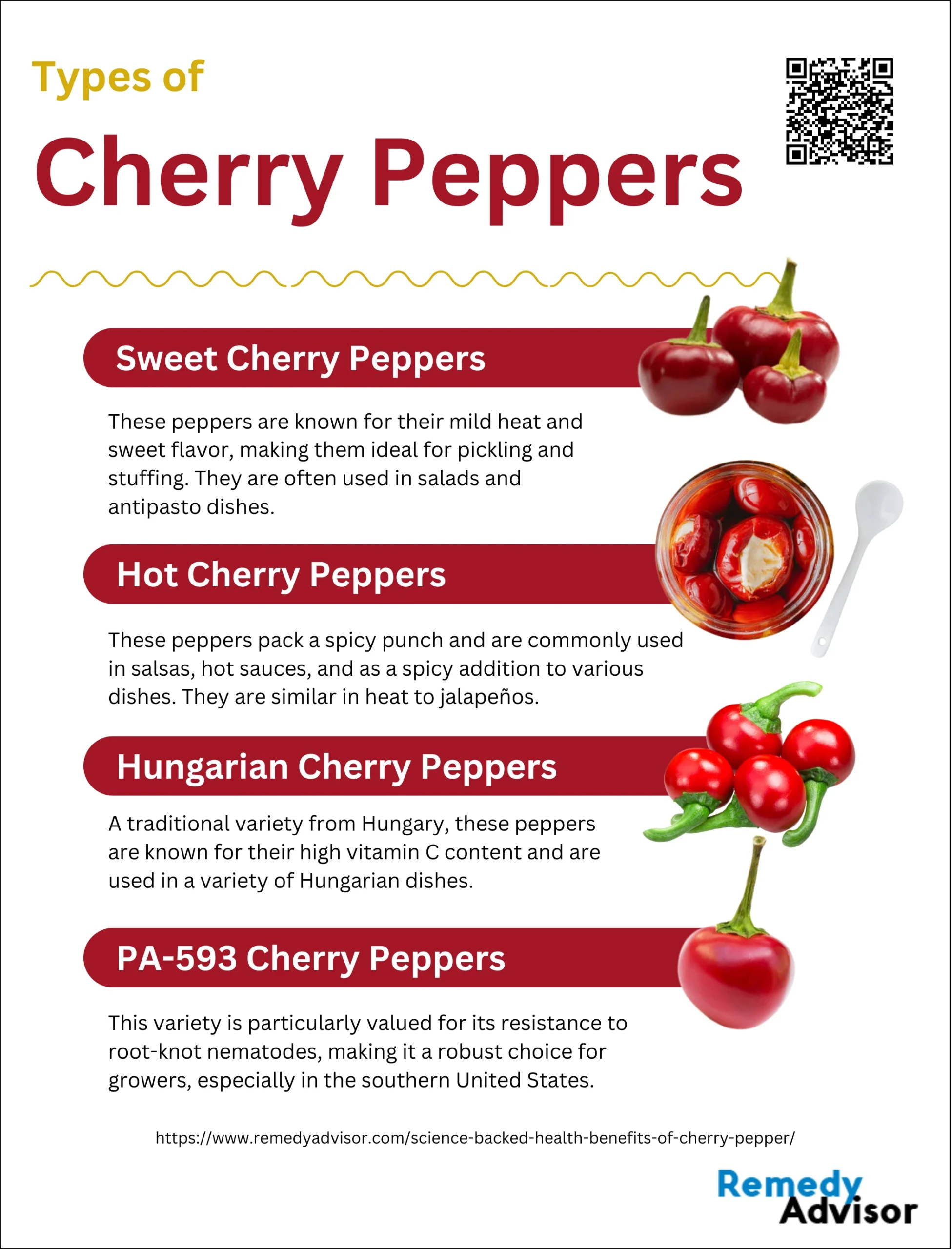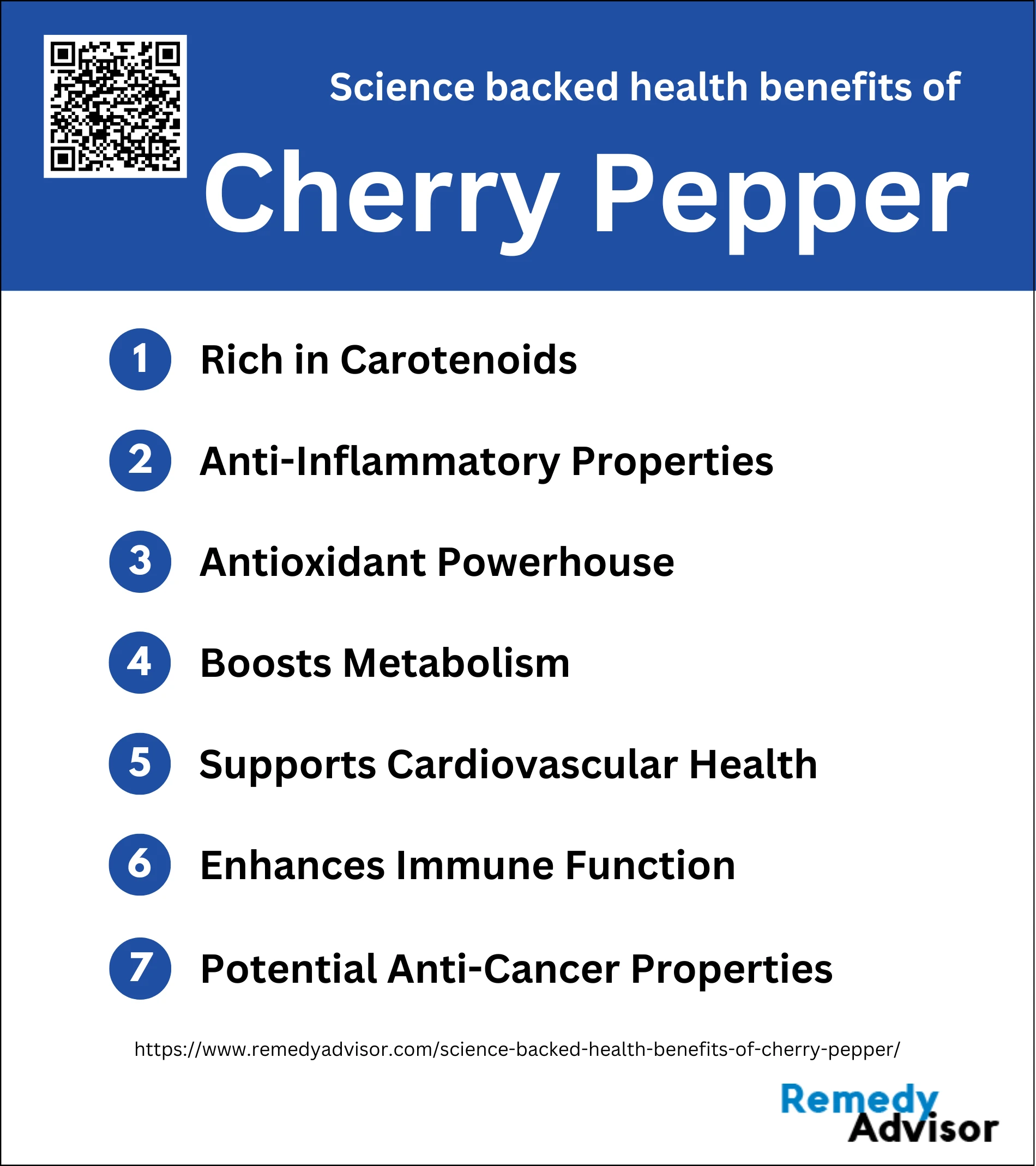Cherry peppers, known for their vibrant red color and piquant flavor, are more than just a culinary delight. These small, round peppers pack a punch not only in taste but also in nutritional value. Scientific research has uncovered a plethora of health benefits associated with cherry peppers, making them a valuable addition to a healthy diet. Rich in vitamins, antioxidants, and capsaicin, cherry peppers have been shown to support cardiovascular health, boost metabolism, and even possess anti-inflammatory properties. This article delves into the science-backed health benefits of cherry peppers, exploring how these fiery little fruits can contribute to overall well-being.
What is Cherry Pepper?
Cherry peppers are small, round, and typically red or green peppers that are widely used in culinary applications for their sweet and mildly spicy flavor. They are often pickled, which involves mass transfer processes between the pepper and the pickling solution, affecting firmness and stability indicators. Cherry peppers can also be dried using vacuum drying techniques, which significantly reduce their moisture content and enhance their shelf life. These peppers are known for their high antioxidant properties, including carotenoids, total phenols, and ascorbic acid, which remain relatively stable during storage. Additionally, cherry peppers undergo significant physico-optical changes as they mature, with red peppers showing more darkening and higher intensity of red color compared to green ones. They are also subject to various agricultural practices, such as pest control and weed management, to ensure healthy growth and high yield. Furthermore, cherry peppers have been studied for their resistance to root-knot nematodes, making them a valuable resource for breeding programs aimed at producing resilient pepper varieties. The acidification process in brined cherry peppers primarily occurs through the stem into the placenta, with oxygen exposure accelerating this process. The ultrastructural development of plastids in cherry peppers during ripening involves the transformation of chlorophyll into carotenoids, contributing to the color change from green to red.
Nutritional Profile of Cherry Peppers
Cherry peppers are not only rich in flavor but also packed with essential nutrients. They are low in calories yet provide a substantial amount of vitamins, minerals, and antioxidants. The nutritional composition of cherry peppers includes a significant amount of dietary fiber, which aids in digestion, and a variety of phytonutrients that contribute to their health benefits. Additionally, cherry peppers contain minimal fat and are a great source of hydration due to their high water content, making them an excellent choice for a healthy diet.
Vitamins (e.g., Vitamin C, B6)
Cherry peppers are a powerhouse of vitamins, particularly Vitamin C and Vitamin B6. Vitamin C, a potent antioxidant, plays a crucial role in boosting the immune system, promoting skin health, and aiding in the absorption of iron from plant-based foods. Cherry peppers can provide over 50 mg of Vitamin C per 100 grams, significantly contributing to the daily recommended intake. Vitamin B6, on the other hand, is essential for brain health and the proper functioning of the nervous system. It helps in the production of neurotransmitters and the formation of red blood cells, making cherry peppers a valuable addition to a balanced diet.
Minerals (e.g., Potassium, Iron)
In addition to vitamins, cherry peppers are rich in essential minerals such as potassium and iron. Potassium is vital for maintaining proper heart function and regulating blood pressure, while iron is crucial for the formation of hemoglobin and the transportation of oxygen in the blood. A 100-gram serving of cherry peppers can provide a significant portion of the daily recommended intake of these minerals, supporting overall cardiovascular health and preventing anemia.
Antioxidants (e.g., Capsaicin)
Cherry peppers are renowned for their high antioxidant content, particularly capsaicin, the compound responsible for their spicy kick. Capsaicin has been extensively studied for its anti-inflammatory and pain-relieving properties. It also plays a role in boosting metabolism and promoting weight loss by increasing energy expenditure. Additionally, cherry peppers contain other antioxidants such as carotenoids and flavonoids, which help protect the body against oxidative stress and reduce the risk of chronic diseases.
Low-Calorie Content
One of the standout features of cherry peppers is their low-calorie content. With only about 31 calories per 100 grams, they are an excellent choice for those looking to manage their weight without sacrificing flavor or nutrition. The low-calorie content, combined with their high fiber and water content, makes cherry peppers a satisfying and healthy snack option that can help control appetite and support weight loss efforts.
Types of Cherry Peppers

Cherry peppers come in several varieties, each offering unique flavors, heat levels, and culinary uses. Here are some notable varieties:
1. Sweet Cherry Peppers: These peppers are known for their mild heat and sweet flavor, making them ideal for pickling and stuffing. They are often used in salads and antipasto dishes.
2. Hot Cherry Peppers: These peppers pack a spicy punch and are commonly used in salsas, hot sauces, and as a spicy addition to various dishes. They are similar in heat to jalapeños.
3. Hungarian Cherry Peppers: A traditional variety from Hungary, these peppers are known for their high vitamin C content and are used in a variety of Hungarian dishes.
4. PA-593 Cherry Peppers: This variety is particularly valued for its resistance to root-knot nematodes, making it a robust choice for growers, especially in the southern United States.
Science backed health benefits of Cherry Pepper
Cherry peppers are more than just a flavorful addition to your meals—they are a nutritional powerhouse. Backed by scientific research, these small but mighty peppers offer a range of health benefits that can enhance your overall well-being. From boosting your immune system with their high vitamin content to promoting heart health through essential minerals, cherry peppers are a versatile ingredient worth incorporating into your diet. In this article, we will explore the top science-backed health benefits of cherry peppers, shedding light on why these fiery little fruits deserve a spot on your plate.

1. Rich in Carotenoids
Cherry peppers are an excellent source of carotenoids, which are pigments with powerful antioxidant properties. These compounds, including capsanthin and zeaxanthin, are known to support eye health by protecting against oxidative stress and reducing the risk of age-related macular degeneration. Additionally, carotenoids like β-carotene contribute to skin health and immune function by converting into vitamin A in the body.
2. Anti-Inflammatory Properties
Cherry peppers contain capsaicin, a compound that imparts their characteristic heat and has notable anti-inflammatory effects. Capsaicin can inhibit the production of pro-inflammatory cytokines, which are molecules involved in chronic inflammation. This makes cherry peppers potentially beneficial for managing conditions like arthritis and inflammatory bowel disease by reducing inflammation and pain.
3. Antioxidant Powerhouse
The high levels of antioxidants in cherry peppers, such as vitamin C and various phytochemicals, help neutralize free radicals in the body. This antioxidant activity is crucial for protecting cells from oxidative damage, which can lead to chronic diseases like cancer and heart disease. Regular consumption of cherry peppers can thus contribute to overall cellular health and longevity.
4. Boosts Metabolism
Capsaicin in cherry peppers is also known to boost metabolism by increasing the body’s heat production and energy expenditure. This thermogenic effect can aid in weight management by enhancing fat oxidation and reducing appetite. Including cherry peppers in a balanced diet can thus support metabolic health and assist in weight loss efforts.
5. Supports Cardiovascular Health

Cherry peppers are beneficial for heart health due to their ability to improve blood circulation and reduce blood pressure. Capsaicin has been shown to promote vasodilation, which helps lower blood pressure and improve blood flow. Additionally, the antioxidants in cherry peppers help prevent the oxidation of LDL cholesterol, reducing the risk of plaque buildup in the arteries and cardiovascular diseases.
6. Enhances Immune Function
The high vitamin C content in cherry peppers plays a crucial role in boosting the immune system. Vitamin C is essential for the production and function of white blood cells, which are vital for fighting infections. Regular consumption of cherry peppers can thus enhance the body’s ability to ward off illnesses and maintain a robust immune response.
7. Potential Anti-Cancer Properties

Research suggests that the compounds found in cherry peppers, including capsaicin and carotenoids, may have anti-cancer properties. Capsaicin has been studied for its ability to induce apoptosis (programmed cell death) in cancer cells without harming normal cells. Additionally, the antioxidant properties of carotenoids help protect DNA from damage that can lead to cancer development.
How to Incorporate Cherry Peppers into Your Diet:
Cherry peppers are versatile ingredients that can add a burst of flavor and heat to various dishes. These small, round peppers, also known as pimentos, can be used fresh, pickled, or cooked, making them easy to incorporate into your daily meals. Whether you prefer them mild or hot, cherry peppers can enhance the taste and nutritional value of your diet. By exploring different preparation methods and recipes, you can discover new and exciting ways to enjoy these flavorful peppers in your culinary creations.
Fresh in Salads:
Adding fresh cherry peppers to salads is an excellent way to introduce a zesty kick and vibrant color to your meal. Slice or chop these peppers and toss them into green salads, pasta salads, or grain-based salads for an extra layer of flavor and texture. Their mild to moderate heat pairs well with crisp vegetables, creamy cheeses, and tangy dressings. For a delicious combination, try mixing cherry peppers with arugula, cherry tomatoes, and mozzarella, drizzled with a balsamic vinaigrette.
Pickled as a Snack:
Pickled cherry peppers make for a delightful and convenient snack. The pickling process enhances their flavor while preserving them for extended periods. These tangy, slightly spicy peppers can be enjoyed straight from the jar or used as a condiment. They’re perfect for adding to charcuterie boards, sandwiches, or as a side to your favorite dishes. For a quick and easy snack, stuff pickled cherry peppers with cream cheese or prosciutto, creating a tasty bite-sized treat that’s sure to impress.
Cooked in Soups and Stews:
Incorporating cherry peppers into soups and stews can add depth and a subtle heat to your dishes. Chop them finely and sauté with other aromatics like onions and garlic as a base for your soup. They work particularly well in tomato-based soups, vegetable stews, or hearty chilis. The peppers will soften as they cook, infusing the broth with their distinctive flavor. For a unique twist, try adding cherry peppers to a traditional minestrone or a spicy black bean soup for an extra kick of flavor.
Added to Sauces and Dips:
Cherry peppers can elevate the taste of various sauces and dips, adding both flavor and color. Blend them into a creamy dip for vegetables or incorporate them into a spicy mayo for sandwiches. They also make an excellent addition to salsa, providing a milder alternative to jalapeños. For a versatile condiment, try making a cherry pepper spread by blending roasted cherry peppers with garlic, olive oil, and herbs. This spread can be used as a sandwich topping, a pasta sauce, or a flavorful accompaniment to grilled meats.

Potential Side Effects
Cherry peppers can cause several side effects if consumed in large quantities. The primary compound responsible for the heat in these peppers, capsaicin, can lead to a range of symptoms from mild discomfort to severe reactions. Common side effects include abdominal pain, nausea, vomiting, and diarrhea. In some cases, excessive consumption can result in a burning sensation in the mouth and throat, which can be quite uncomfortable. It’s important to consume cherry peppers in moderation to avoid these potential issues and enjoy their benefits without the adverse effects.
Digestive Issues with Excessive Consumption
Eating too many cherry peppers can lead to significant digestive problems. Capsaicin, the active component in these peppers, can irritate the lining of the stomach and intestines, causing symptoms such as stomach pain, cramps, and diarrhea. Overconsumption can also lead to nausea and vomiting, as the body attempts to rid itself of the irritant. For those with sensitive digestive systems or pre-existing conditions like irritable bowel syndrome (IBS), even moderate amounts of cherry peppers can exacerbate symptoms. Therefore, it’s crucial to monitor your intake and be mindful of how your body reacts to these spicy additions.
Allergic Reactions
While not as common as other food allergies, some individuals may experience allergic reactions to cherry peppers. Allergic responses can range from mild to severe and may include symptoms such as itching, swelling, hives, and gastrointestinal distress. In rare cases, consuming cherry peppers can trigger anaphylaxis, a severe and potentially life-threatening reaction that requires immediate medical attention. Those with known allergies to other members of the nightshade family, such as tomatoes or bell peppers, should exercise caution and consult with an allergist to determine if cherry peppers are safe for them to consume.
Conclusion
In conclusion, cherry peppers are not only a flavorful addition to various culinary dishes but also offer numerous health benefits backed by scientific research. These small, round peppers are rich in essential vitamins, minerals, and antioxidants, including Vitamin C, Vitamin B6, potassium, iron, and capsaicin. Their high antioxidant content helps protect against oxidative stress, supports eye and skin health, and boosts the immune system. Capsaicin, the compound responsible for their spiciness, has anti-inflammatory properties and can enhance metabolism, aiding in weight management and cardiovascular health. However, it is important to consume cherry peppers in moderation to avoid potential side effects such as digestive issues and allergic reactions. Overall, incorporating cherry peppers into a balanced diet can contribute to improved health and well-being.
ADDITIONAL RESOURCES
Here is a list of US organizations involved in research on herbs and spices, along with their short descriptions and URLs:
1. American Botanical Council (ABC)
ABC is a leading nonprofit organization dedicated to providing reliable information on the benefits and uses of herbs and spices. They conduct and publish research on various medicinal plants.
2. Herbal Research Foundation (HRF)
HRF is a nonprofit organization focused on scientific research and education regarding the health benefits and safety of herbs and spices.
3. National Center for Complementary and Integrative Health (NCCIH)
NCCIH is part of the National Institutes of Health and supports research on diverse medical and health care systems, practices, and products that are not generally considered part of conventional medicine, including herbs and spices.
4. American Herbal Pharmacopoeia (AHP)
AHP is a nonprofit organization that publishes standards and monographs on the quality, purity, and therapeutics of botanical medicines, including herbs and spices.
5. Herb Research Foundation (HRF)
HRF conducts scientific research on herbs and publishes its findings to promote the responsible use of herbal products for health and well-being.
6. The American Herbalists Guild (AHG)
Description: AHG is a nonprofit, educational organization that promotes clinical herbalism as a viable profession rooted in ethics, competency, diversity, and freedom of practice.
7. Botanical Research Institute of Texas (BRIT)
BRIT is a nonprofit international research and education center focused on plant-based studies, including herbs and spices.
8. Council for Responsible Nutrition (CRN)
CRN is a leading trade association representing dietary supplement and functional food manufacturers and ingredient suppliers, focusing on research and regulation of herbal supplements.
Recommendations for books on Cherry Pepper
Here are some book recommendations on the research of Cherry Pepper along with their links:
1. “The Complete Chile Pepper Book: A Gardener’s Guide to Choosing, Growing, Preserving, and Cooking” by Dave DeWitt and Paul W. Bosland
This book covers various types of peppers, including Cherry Peppers, with detailed information on their cultivation, care, and culinary uses. It also includes research on different pepper varieties.
2. “Peppers of the Americas: The Remarkable Capsicums That Forever Changed Flavor” by Maricel E. Presilla
This book explores the diversity of peppers in the Americas, providing a comprehensive look at different varieties, including Cherry Peppers. It covers historical, botanical, and culinary aspects.
3. “The Pepper Book: A Comprehensive Guide to the Cultivation, History, and Varieties of the World’s Peppers” by Clifford A. Wright
This book offers a thorough overview of pepper varieties, including Cherry Peppers. It delves into their history, cultivation methods, and culinary uses, supported by research and expert insights.
4. “Chili Pepper Breeding and Genetics” edited by D.S. Smith, P. Bosland, and E. Votava
Focused on the genetics and breeding of chili peppers, this book includes scientific research on various pepper types, including Cherry Peppers. It is suitable for those interested in the genetic aspects and breeding techniques.
5. “Capsicum: The Genus Capsicum” edited by Amit Krishna De
This book provides an in-depth look at the Capsicum genus, including Cherry Peppers. It covers chemical composition, cultivation, and various applications in food and medicine.
FAQS
- What are the main nutritional benefits of cherry peppers?
Cherry peppers are rich in vitamins A and C, as well as antioxidants like flavonoids and carotenoids. They also contain fiber and are low in calories. - Can cherry peppers boost the immune system?
Yes, cherry peppers can boost the immune system due to their high vitamin C content. A single cherry pepper contains more than 100% of the daily recommended intake of vitamin C. - Do cherry peppers have anti-inflammatory properties?
Yes, cherry peppers have anti-inflammatory properties, which can help reduce inflammation throughout the body. - Can cherry peppers aid in weight loss?
Cherry peppers may aid in weight loss as they are low in calories and high in fiber, which can promote feelings of fullness. Some studies suggest that spicy foods like cherry peppers can boost metabolism. - How do cherry peppers support digestive health?
Cherry peppers contain capsaicin, a compound that can help improve digestion and reduce symptoms of indigestion. Capsaicin is also believed to have anti-bacterial properties that can help prevent the growth of harmful bacteria in the gut. - Are cherry peppers good for heart health?
While specific studies on cherry peppers are limited, research on hot peppers in general suggests they may be beneficial for heart health. Capsaicin has been associated with improved blood vessel function and reduced risk of heart disease. - Do cherry peppers have antioxidant properties?
Yes, cherry peppers are loaded with antioxidants, which help protect against cellular damage caused by free radicals. - Can cherry peppers help reduce the risk of chronic diseases?
The antioxidants in cherry peppers may help reduce the risk of chronic diseases such as cancer, heart disease, and Alzheimer’s disease. - Are there any potential side effects of consuming cherry peppers?
While generally safe for most people, consuming large amounts of spicy peppers like cherry peppers can cause digestive discomfort in some individuals, particularly those with irritable bowel syndrome or acid reflux. - How can cherry peppers be incorporated into a healthy diet?
Cherry peppers can be added to various dishes to enhance flavor and nutrition. They can be used in salads, sandwiches, sauces, or as a topping for pizzas and other foods.







